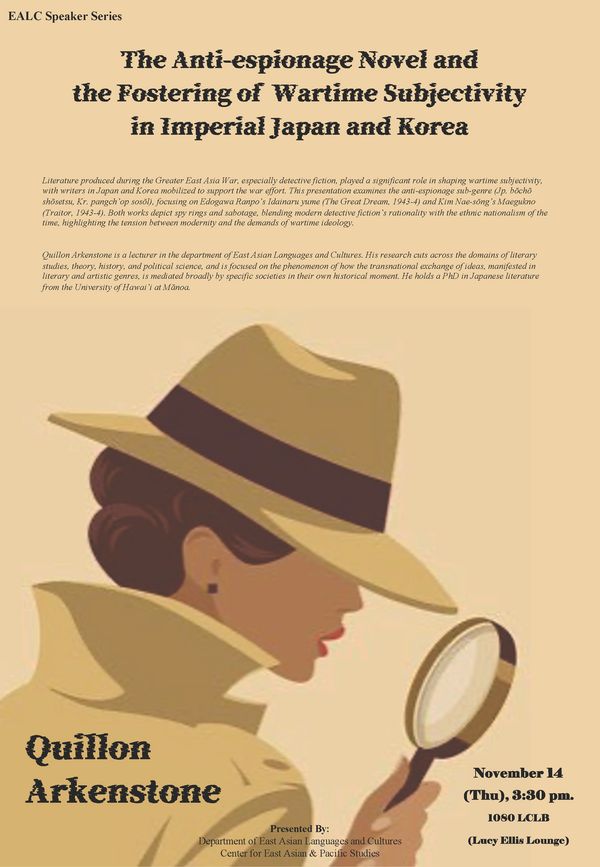
EALC Speaker Series | Quillon Arkenstone "The Anti-espionage Novel and the Fostering of Wartime Subjectivity in Imperial Japan and Korea"
- Event Type
- Lecture
- Sponsor
- Hosted by Department of East Asian Languages and Cultures; Co-sponsored by Center for East Asian & Pacific Studies
- Location
- Lucy Ellis Lounge - 1080 LCLB (707 S. Mathews Ave.)
- Date
- Nov 14, 2024 3:30 pm
- Speaker
- Quillon Arkenstone (Lecturer, Department of East Asian Languages and Cultures)
- Views
- 208
- Originating Calendar
- CEAPS Events Calendar
About the Talk
Forgotten in Japan and maligned as collaboration in Korea, literature produced during the Greater East Asia War is nevertheless recognized as having played an important role in the creation and maintenance of a wartime subjectivity. Writers from both societies were mobilized in support of the war, and this included those active in detective fiction, arguably the war’s most popular genre. While recent scholarship has begun to offer a composite view of the genre and its preeminent figures in the modern period, works produced during the years 1941-45 continue to be given short shrift, a gap this presentation addresses by examining a sub-genre of detective fiction that was particularly active during the war, the anti-espionage, or spy, novel (Jp. bōchō shōsetsu, Kr. pangch’op sosŏl). Focusing on Edogawa Ranpo’s Idainaru yume (The great dream, 1943-4), and Kim Nae-sŏng’s Maegukno (Traitor, 1943-4) two works that immerse readers in the subjective experience of the war through depictions of spy rings, technological secrets and sabotage, I highlight the genre’s attempts to reconcile the enlightenment thinking of modern detective fiction with the sanguinary ethnic nationalism permeating the conflict. The result, cast into relief by the genre’s differing trajectories in metropole and colony, is a contradiction between a dependence on a rational modernity and the pressure to accommodate wartime ideology, in whose name that modernity was being reoriented to serve a very irrational war.About the Speaker
Quillon Arkenstone is a lecturer in the Department of East Asian Languages and Cultures. His research cuts across the domains of literary studies, theory, history, and political science, and is focused on the phenomenon of how the transnational exchange of ideas, manifested in literary and artistic genres, is mediated broadly by specific societies in their own historical moment. He holds a PhD in Japanese literature from the University of Hawai’i at Mānoa.